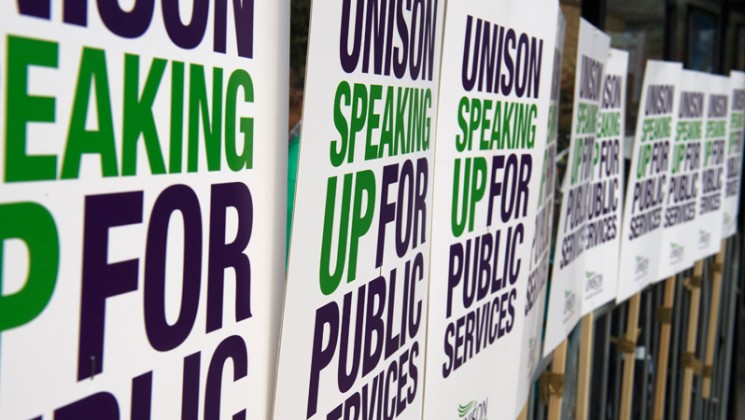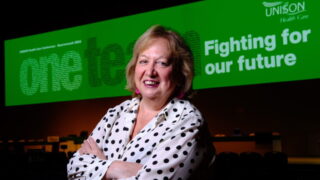“We are very much involved on Brexit – but the union is also doing much more on the major issues which affect public services and public service workers,” general secretary Dave Prentis told the UNISON national executive council when it met.
But Brexit was still a key part both of his report and the debate in the meeting.
The situation is changing by the minute, the NEC heard as it met just nine days before Britain is due to leave the EU without a deal.
Mr Prentis noted that public services unions from across the world are meeting at the PSI Congress tomorrow, and the experience of colleagues dealing with WTO rules is “it’s public services that suffer as transnational companies come in and take over.”
Another priority for UNISON has always been to have “nothing that impinges on the Good Friday Agreement,” a point reiterated strongly by Northern Ireland members.
“We cannot tolerate having a no-deal exit,” declared Mr Prentis.
The NEC agreed that proposals for “Common Market 2.0” or “Norway +” with the single market and a customs union, best meet the union’s tests on behalf of members, and the union would support the principle of a confirmatory referendum on any agreement, depending on the question, if it proves impossible to have a general election.
But, “as a union, we have got to get in first and say what we want for a future relationship with the European Union and the rest of the world, and how that is negotiated.”
However, the issues which face the country, above and beyond Brexit, are crying out for a general election, the NEC heard.
“There is so much more that we as a union are having to take forward, but is being ignored by the government,” said Mr Prentis.
The general secretary highlighted some of these key issues.
Sleep-in payments and allowances for care workers are a major issue, with employers trying to cut payments and being met with members prepared to take industrial action. At the same time, the union is taking a case arguing that sleep-in shifts should be paid at the minimum wage to the Supreme Court.
Universal credit is another big issue, with 1.6m now on the new system, and the union the union agreed it “needs to get over to people the suffering being caused to so many people.”
The NEC also pledged to continue and increase the support and publicity for the parliamentary petition against the universal credit two-child limit.
UNISON also stressed that care workers and their issues need to be picked up by Labour, at a meeting with the party leadership, which discussed election planning.
And the union is launching its own dedicated campaign for social care and the workers who make it a reality for the vulnerable members of our society.
On top of that, the union marked the 20th anniversary of the national minimum wage this week with a parliamentary reception where young members met MPs and put the case for a living wage for all and the abolition of the discriminatory youth rates which pay less, with the hashtag #OneWageAnyAge.
Turning to organisational issues, the NEC received a report on plans for another ‘going for growth’ campaign in May, building on the success of the union’s Grovember campaign at the end of last year.
That saw historic growth figures in November itself, but also “unprecedented” figures for each month since, with three of the union’s regions now bigger than they’ve ever been, another two regions moving into growth after struggling with job losses, and other regions stabilised.
May’s campaign will be about retention and continued growth, building on those results.
In an atmosphere of increasing racism, the NEC congratulated anti-racism campaign Hope not Hate for its role in preventing a fascist plot to murder MP Rosie Cooper, revealed in a recently completed trial.
The NEC also:
- agreed its policy toward the 131 motions on the national delegate conference preliminary agenda;
- agreed amendments to motions, which will be submitted to NDC standing orders committee;
- agreed its policy on the rule amendments put forward for debate at conference;
- agreed the draft NEC Annual Report to conference;
- received a report on the preliminary conference plan, including inviting one guest speaker from the Zimbabwe Congress of Trade Unions, plus another one to be decided.=;
- received the latest recruitment and organising reports from January and February;
- received bargaining and organising updates from the various service groups;
- reviewed industrial action, and ballots, across the union;
- heard a report on the preparation of the annual accounts.
In addition, the NEC voted to suggest 12 motions and six rule amendments to be prioritised for debate at conference.
The motions are:
- motion 77 – Progressive taxes to end austerity;
- motion 22 – Smash the gender pay gap;
- motion 1 – Developing organising resources in branches and regions;
- motion 47 – Austerity and public service;
- motion 126 – Resourcing our branches – a UNISON priority;
- motion 80 – Curbing corporate power;
- motion 121 – Stopping social insecurity;
- motion 70 – Tackling the crisis in social care;
- motion 9 – Addressing the skills crisis through UNISON learning;
- motion 102 – The trade union response to fascism – No Pasaran;
- motion 81 – Brazil;
- motion 111 – Energy: Climate change – a just transition and jobs for a low carbon economy.
The rule changes the NEC wants to prioritise are:
- rule amendment 1 – Schedule B: benefits of members in education;
- rule amendment 4 – Rule C: obligations of membership;
- rule amendment 19 – Rule G: branch meetings;
- rule amendment 20 – Rule G: branch officers;
- rule amendment 21 – Rule G: the branch secretary;
- rule amendment 2 – Rule B: union democracy.




